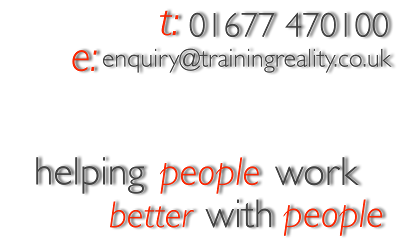communication skills training courses - case studies
We think the best way to get a flavour of our approach to communication skills training is to take a look at some of the courses we've run for our clients. A couple of examples (click each to read more) are:
We've also written extensively about communication and communication theory, and the following articles may be of interest:
After taking a look at those, come back and read more about our general approach to communication training programmes.
communication skills programmes - our principles
Our training courses in helping people and teams develop their communication skills fall into two categories - courses for groups from a single company, and communication development courses for individuals.
The common aspects of our work in delivering communication skills training courses to teams are as follows:
- treating every member of the team, and the team as a whole, with the utmost respect. We never tell anyone the "right" way to do things
- creating a very honest, open, and caring environment where people feel free to share their concerns and perceived weaknesses with a supportive group of colleagues
- challenging people to imagine and experiment with new styles of communication - trying them on for size
- giving everyone the opportunity to contribute, to feel good about themselves, and to understand their capacity for growth and development
- managing conflict, or potential conflict, in a way that diffuses the current situation but allows for exploration of the underlying causes
- ensuring that everyone is capable of leaving the course with new knowledge, skills and attitudes to dramatically improve their communication
The way we cover communication skills varies enormously, and depends heavily on a joint pre-courses assessment of what the needs are, and the flexibility during the course to change and adapt the approach as needed. As an indication of the areas we tend to get involved in, please take a look at the examples below:
communication using Myers-Briggs
We've found that using Myers-Briggs (MBTI) profiling as part of creating an understanding and appreciation of differing communication styles and approaches hugely valuable. As with all the management training tools we use, we don't "teach" MBTI as a subject in itself, but use it effectively to deliver the communication training our clients need.
By looking not only at the individual dichotomies, but looking at specific combinations, we can access a rich resource of information about people's preferred communication styles. This knowledge is then advanced to develop the skill to both adapt our own communication styles as well as create a greater appreciation of the styles of others, enabling the individuals and the team as a whole to be much more flexible, resourceful and successful in their communication.
As with all our courses, we introduce the theory, use real-world, practical, and usually outdoors experiential learning to flesh out and internalise the knowledge gained, and then focus on reviews to really capture the essence of what has been learnt and ensure that it is translated into practical benefits back at work.
communication using NLP (Neuro Linguistic Programming)
NLP, it goes without saying, has a massive amount to offer in terms of developing a greater understanding of our own communication styles, and how our styles come across to others. By enabling us to take a very deep look at the language we use, we can deconstruct the "meant" meanings, the "implied" meanings, and the wide range of potential meanings to help us refine and develop our communication skills.
It is almost impossible to overestimate the power of having a greater understanding of your own communication abilities and in-built patterns, let alone the skills and attitude that helps you to change the patterns you use at will. Whether you are selling to, motivating, supporting, encouraging or even disciplining others, enhancing the range of your capabilities to do so will make you far more successful.
As with all our courses, we introduce the theory, use real-world, practical, and usually outdoors experiential learning to flesh out and internalise the knowledge gained, and then focus on reviews to really capture the essence of what has been learnt and ensure that it is translated into practical benefits back at work.
communication using radios
A very simple "trick" this one, but, by operating outdoors, across acres and acres of the most beautiful countryside, we can split teams up and deny them the opportunity for face-to-face communication. This, when contrasted with challenges set when face-to-face communication is allowed, brings into stark relief the issues that need to be dealt with when teams are geographically split or non-office based.
communication using common sense
Sounds obvious, but common sense is missed far too often on training courses, overruled by the latest fancy theory and snazzy quotes from the "gurus". We don't miss this part, at all. By giving teams the opportunity to undertake challenges and tasks, and then simply reviewing with them what went well and what didn't, it's (no longer, to us!) astonishing what comes out.
Our skill here is in genuine, open facilitation, and in creating the environment for people to come up with their own answers - much, much more powerful than listening to a lecture.
please click on the images below to find out more about the training areas we focus on




